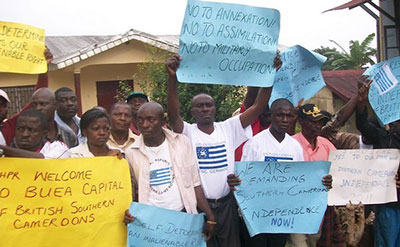New York, November 8, 2012–The Committee to Protect Journalists today called on Cameroonian officials to drop criminal charges against a journalist arrested last month in the southwestern town of Buea for covering a secessionist gathering. The journalist is free on bail but faces a fine and up to six months in jail.
Baature Edua Mvochou, a Nigerian national and editor of African Drum magazine published Jos, Nigeria, still faces a charge of unlawful assembly. Today, the court heard his defense and the case was adjourned until March 14, his lawyer, Ajong Stanislaus Anuaboudem, told CPJ.
Edua was arrested on October 1 as he and Martin Yembe Fon, editor of local newspaper The Frontier Telegraph, tried to cover a gathering at a local church, according to news reports and local journalists. Police officers stopped Fon and Edua and seized their press cards before ordering them to go inside, Fon told CPJ. “While in the church, we took pictures of the over 100 activists and church officials praying,” he said. “Midway into the prayers, a large contingent of policemen invaded the premises with police vans, ordering all to walk into the vans or be brutalized.”
Fon and Edua were driven along with the others to the central police station in Buea, where they were interrogated, fingerprinted, and photographed, leading independent daily Le Messager reported. After 10 hours of detention, they were taken to court and charged with unlawful assembly under Section 231(a) of the Cameroonian Penal Code, defense lawyer Anuaboudem told CPJ. Charges against Fon were later dropped, he said. The charge carries a maximum sentence of six months in prison and a fine of 100,000 CFA francs (US$200). The journalists were released on bail at midnight on October 2, after six hours at the courthouse, Fon said.
Police have not returned Fon’s digital camera or recorder, he said.
“Martin Yembe Fon and Baature Edua were apparently unconvenient witnesses to a crackdown on a gathering of secessionists, an issue of national public interest the Cameroonian government would rather suppress,” said CPJ Africa Advocacy Coordinator Mohamed Keita. “We urge Cameroon authorities to drop charges against Edua, who was doing his job.”
The activists had gathered to commemorate the date in 1961 on which the local province–formerly under British colonial mandate as Southern Cameroons–became part of the French-speaking Republic of Cameroon, according to the journalists and news reports. For the government, the date is a commemoration of national unity, but locals use the occasion to renew long-standing demands for secession from Cameroon. Le Messager quoted an unnamed police officer as saying that security forces stormed the church to prevent the group from staging a protest march after the service.
At an October 19 press conference, Cameroon government spokesman Issa Tchiroma Bakary denied that journalists are detained in the country for their work, according to news reports. He was speaking in response to joint findings by CPJ, PEN International and France-based Internet Sans Frontières that investigating corruption and reporting on political unrest are punishable acts for Cameroonian journalists. “We can observe, while regretting it, that certain ordinary citizens, journalists by profession, sometimes find themselves in our prisons, following accusations based on common law offenses, punishable by criminal law,” Bakary said.
EDITOR’S NOTE: The text has been corrected to reflect that Martin Yembe no longer faces charges, and that neither journalist entered a plea on October 1, as previously reported. The spelling of Baature Edua Mvochou’s name has also been corrected.
